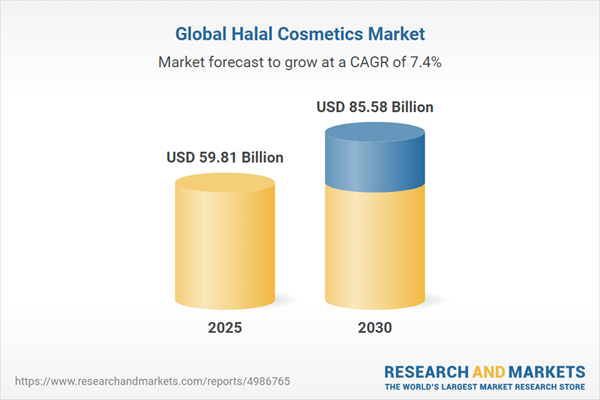The halal cosmetics market, encompassing products free from animal-derived ingredients or genetically modified organisms deemed non-compliant with Islamic law, is poised for significant growth driven by rising consumer awareness, increasing disposable incomes, and a growing Islamic population. These cosmetics appeal to Muslim consumers prioritizing ingredient transparency and compliance with halal certifications, while also gaining traction in non-Islamic countries due to ethical and health-conscious trends. Below is a summary of key growth drivers and geographical trends from 2024 onward, tailored for industry experts.
Market Growth Drivers
Rising Demand for Skin Care Products
Increasing skin health concerns, exacerbated by climate change, are fueling demand for halal skin care products. Harsh sunlight exposure contributes to issues like pigmentation, rough skin texture, and lentigines, prompting consumers to seek specialized solutions. The growing popularity of skincare routines, particularly among younger generations with higher disposable incomes, is boosting the skin care segment. Additionally, awareness of animal cruelty-free products, such as halal cosmetics, is driving demand in developed markets, as consumers prioritize ethical and sustainable options.Growing Islamic Population
The global rise in the Islamic population, driven by a young demographic, higher fertility rates, and low religious conversion rates, is a significant factor propelling the halal cosmetics market. This population growth is expected to increase demand for halal-certified products, particularly in regions with large Muslim communities, thereby supporting market expansion over the forecast period.Surge in Online Sales Channels
The e-commerce segment is experiencing robust growth due to widespread internet access and the convenience of online shopping. Benefits such as product comparison, customer reviews, convenient delivery, easy returns, and discounts are driving online sales of halal cosmetics. The rising disposable income further supports this trend, enabling consumers to invest in premium cosmetic products. The growing momentum of animal cruelty-free products on e-commerce platforms is expected to further accelerate market growth.Geographical Outlook
North America
The North American halal cosmetics market is projected to experience significant growth, driven by changing lifestyles and increasing per capita expenditure on cosmetics. The rising Muslim population in the region, coupled with demand for value-added, halal-certified products, is a key growth factor. Consumer preference for ethical and transparent products also supports market expansion.Middle East
The Middle East, with its predominantly Islamic countries such as Saudi Arabia, the United Arab Emirates, Kuwait, Bahrain, Oman, and Qatar, is expected to see positive growth in halal cosmetics demand. The region’s cultural alignment with halal principles and increasing consumer awareness drive market potential.Asia Pacific
The Asia Pacific region holds strong growth prospects, particularly due to the growing Muslim population in countries like India. Rising demand for halal-certified cosmetics, supported by increasing disposable incomes and awareness of ethical products, is expected to fuel market growth over the forecast period.Conclusion
The halal cosmetics market is set for robust growth from 2024 onward, driven by increasing skin health awareness, a rising Islamic population, and the expansion of e-commerce. North America, the Middle East, and Asia Pacific are key growth regions, with demand fueled by ethical consumer trends and halal certification compliance.Key Benefits of this Report:
- Insightful Analysis: Gain detailed market insights covering major as well as emerging geographical regions, focusing on customer segments, government policies and socio-economic factors, consumer preferences, industry verticals, and other sub-segments.
- Competitive Landscape: Understand the strategic maneuvers employed by key players globally to understand possible market penetration with the correct strategy.
- Market Drivers & Future Trends: Explore the dynamic factors and pivotal market trends and how they will shape future market developments.
- Actionable Recommendations: Utilize the insights to exercise strategic decisions to uncover new business streams and revenues in a dynamic environment.
- Caters to a Wide Audience: Beneficial and cost-effective for startups, research institutions, consultants, SMEs, and large enterprises.
What do businesses use our reports for?
Industry and Market Insights, Opportunity Assessment, Product Demand Forecasting, Market Entry Strategy, Geographical Expansion, Capital Investment Decisions, Regulatory Framework & Implications, New Product Development, Competitive IntelligenceReport Coverage:
- Historical data from 2022 to 2024 & forecast data from 2025 to 2030
- Growth Opportunities, Challenges, Supply Chain Outlook, Regulatory Framework, and Trend Analysis
- Competitive Positioning, Strategies, and Market Share Analysis
- Revenue Growth and Forecast Assessment of segments and regions including countries
- Company Profiling (Strategies, Products, Financial Information, and Key Developments among others).
Key Market Segments
- By Product Type
- Personal Care Products
- Skincare
- Hair care
- Make-up
- Personal Hygiene Products
- Others
- Color Cosmetics
- Fragrances/Perfumes
By Sales Channel
- Online
- Offline
By Consumer Demographics
- Women
- Men
- Gen Z
By Distribution Channel
- Online
- Offline
- Supermarkets
- Specialty Retail
- Others
By Geography
- North America
- USA
- Canada
- Mexico
- South America
- Brazil
- Argentina
- Others
- Europe
- Germany
- France
- United Kingdom
- Spain
- Others
- Middle East and Africa
- Saudi Arabia
- Israel
- UAE
- Others
- Asia Pacific
- China
- Japan
- Malaysia
- India
- Indonesia
- Thailand
- Taiwan
- Others
Table of Contents
Companies Mentioned
- Amara Cosmetics
- Wardah Cosmetics
- Ecotrail Personal Care Pvt. Ltd.
- L'Oreal S.A.
- Clara International Beauty Group
- INIKA Organic
- PHB Ethical Beauty Ltd
- Halal Beauty Inc.
- Claudia Nour Cosmetics
- IVY Beauty Corporation Sdn Bhd
- Sampure Minerals
Table Information
| Report Attribute | Details |
|---|---|
| No. of Pages | 147 |
| Published | June 2025 |
| Forecast Period | 2025 - 2030 |
| Estimated Market Value ( USD | $ 59.81 Billion |
| Forecasted Market Value ( USD | $ 85.58 Billion |
| Compound Annual Growth Rate | 7.4% |
| Regions Covered | Global |
| No. of Companies Mentioned | 11 |









